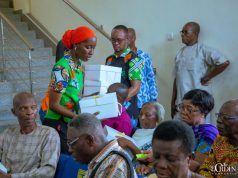A seminal book documenting the heritage of Ghana’s Kusaas people, The Kusaas: An Indigenous Perspective, was launched at the University of Ghana’s Institute of African Studies on April 3, 2025.
The 12-chapter volume, authored and edited by Kusaas natives, marks the first comprehensive account of the ethnic group’s history, traditions, and cultural struggles, culminating in a seven-year research effort.
Chaired by former Zambaran Chief and parliamentarian Cletus Apul Avoka, the event drew academics, community leaders, and descendants of the Kusaas, whose ancestral lands span northeastern Ghana and southern Burkina Faso. Avoka, reflecting on his youth as a dancer and singer in Navrongo, emphasized the book’s role in reviving near-eroded traditions: “This work safeguards our identity for future generations.”
The text traces the Kusaas’ origins, language (Kusaal), and pre-colonial societal structures while examining threats to their cultural continuity, including colonial disruptions and modern assimilation pressures. Retired police commissioner James Azumah Abbas Abbah, a co-author, noted, “Our songs and rituals were suppressed, but our voices endure through this record.”
Editors Hasiyatu Abubakar, Agnes Apusigah, and Agoswin Musah highlighted its interdisciplinary approach, blending oral histories with academic rigor. Reviewer Prof. Samuel Abubakari praised its value as a primary resource for scholars and general readers alike.
Publisher Fred Larbi of Digibooks Ghana Ltd acknowledged the project’s complexity, noting contributions from linguists and anthropologists. A first-edition copy sold for GH¢20,000 at auction, underscoring the demand for marginalized narratives.
The launch coincides with broader efforts to reclaim African heritage amid UNESCO warnings that 30% of the continent’s languages face extinction by 2030. Similar initiatives, like Kenya’s Ogiek Memory Book and Botswana’s San Cultural Archives, highlight indigenous communities’ race to document traditions before elder custodians pass.
For the Kusaas, whose population numbers roughly 500,000, the book counters historical marginalization. Unlike Ghana’s well-documented Akan or Ewe groups, smaller ethnicities often rely on outsider accounts—a gap this project addresses. Challenges remain, however, as urbanization and globalization dilute youth engagement with ancestral practices.
Academics argue such works must extend beyond print to digital archives and community programs. As Avoka affirmed, preservation is not merely retrospective but a foundation for cultural resilience in an interconnected world.
Send your news stories to newsghana101@gmail.com
Follow News Ghana on Google News

















